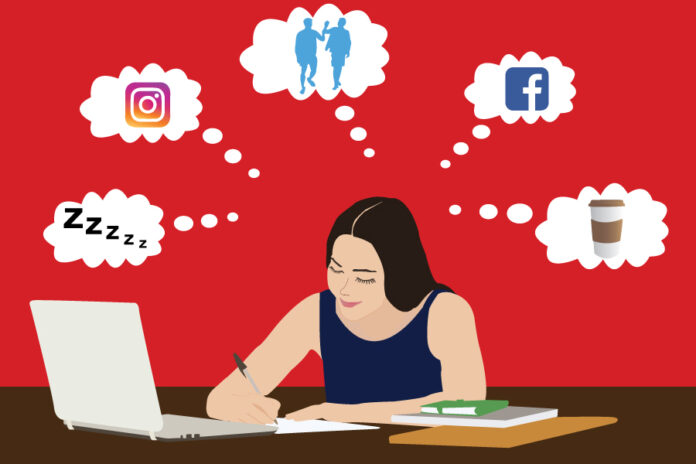Instead of cramming for exams, taking advantage of the brain’s own memory and attention networks could be the grade changer.
Exams challenge students to find creative ways to remember every detail from the first day of classes to the last.
Each strategy impacts the brain’s memory and attention networks. Memory is a collection of abilities, such as remembering events, learning skills and building fact-based knowledge and interactions. Attention involves the brain implementing relevant goals such as being able to focus on material that relates to exams.
“Passive listening and passive reading are time-consuming and less likely to improve attention,” said Joy Geng, associate professor in the Department of Psychology. “You can improve your attention by linking new information to another existing body of knowledge that you have.”
The brain is always taking in information and environments shape the way that people process it.
“One of the myths out there is that people can turn memory encoding on or off,” said Charan Ranganath, professor in the UC Davis Department of Psychology. “It’s always on, but we can focus our attention on different things.”
For students who get easily distracted, crowded and noisy environments may receive more of their attention than their studies. They may leave these environments remembering conversations happening around them or the atmosphere more than their study materials. Distractible students should seek quieter studying environments to help improve focus.
“Attention boosts signals and makes others less noticeable,” said Ron Mangun, distinguished professor of psychology and neurology. “You become more aware of the things you attend to, and when you ignore something, you become less aware of it.”
It is possible to become aware of too many things. Rapidly switching one’s attention from subject to subject, which occurs in multi-tasking, can result in lapses in retaining information.
“Multi-tasking reduces your performance because there’s a switching cost,” Mangun said. “We have a limited capacity of cognitive resources to allocate to tasks. There are only so many things you can hold in your head, if there’s a distraction, you might miss something.”
While trying to focus on everything at the same time, important details and concepts may get left out.
“Our lab, and many other labs, has shown that the best way to retain information over time is to test yourself,” Ranganath said. “Go over what you are trying to learn and test yourself on them. For equations, foreign languages or vocabulary words, use flashcards or an online testing site. For more complex readings, like history, read and then write summaries of what you read. Explain what you are studying to a classmate. Test yourself, go back to your study materials and fill in the right answer. Rinse and repeat for successful retention. Studies show you can get a 50 percent increase in retention if you test yourself than if you repeatedly study the same materials.”
Written by: Foxy Robinson⸺science@theaggie.org




